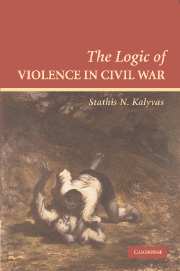Book contents
- Frontmatter
- Contents
- List of Tables and Figures
- Acknowledgments
- List of Abbreviations
- The Logic of Violence in Civil War
- INTRODUCTION
- 1 CONCEPTS
- 2 PATHOLOGIES
- 3 BARBARISM
- 4 A THEORY OF IRREGULAR WAR I
- 5 A THEORY OF IRREGULAR WAR II
- 6 A LOGIC OF INDISCRIMINATE VIOLENCE
- 7 A THEORY OF SELECTIVE VIOLENCE
- 8 EMPIRICS I
- 9 EMPIRICS II
- 10 INTIMACY
- 11 CLEAVAGE AND AGENCY
- CONCLUSION
- Appendix A Data Sources
- Appendix B Coding Protocols
- Appendix C Timeline of Conflicts
- References
- Index
- Titles in the series
8 - EMPIRICS I
COMPARATIVE EVIDENCE
Published online by Cambridge University Press: 05 June 2012
- Frontmatter
- Contents
- List of Tables and Figures
- Acknowledgments
- List of Abbreviations
- The Logic of Violence in Civil War
- INTRODUCTION
- 1 CONCEPTS
- 2 PATHOLOGIES
- 3 BARBARISM
- 4 A THEORY OF IRREGULAR WAR I
- 5 A THEORY OF IRREGULAR WAR II
- 6 A LOGIC OF INDISCRIMINATE VIOLENCE
- 7 A THEORY OF SELECTIVE VIOLENCE
- 8 EMPIRICS I
- 9 EMPIRICS II
- 10 INTIMACY
- 11 CLEAVAGE AND AGENCY
- CONCLUSION
- Appendix A Data Sources
- Appendix B Coding Protocols
- Appendix C Timeline of Conflicts
- References
- Index
- Titles in the series
Summary
It is difficult to really understand this war here – it is a very complicated thing.
A Mozambican peasantThen I asked the question to which I had long been seeking an answer: “Which side, then, has committed more crimes here, the Right or the Left?”
“I can only tell you the side that happens to have most power in one district or another also has the most opportunity to commit them.”
Kevin Andrews, The Flight of IcarusIn this chapter I focus on control: how to measure it, how it shifts, and how it relates to violence. I then provide broad comparative evidence, a plausibility test and a necessary first step. Chapter 9 supplies a rigorous test in a specific setting.
MEASURING CONTROL
The most significant empirical challenge is the measurement of control. Control can be defined and measured empirically, using various indicators such as the level of, presence of, and access enjoyed by political actors in a given place and time. Ideally, the perfect indicator of control would reflect “the probability that a certain event or class of events will not occur within a defined area within a defined period of time, for example … the probability that the there will be no movement of external hostile individuals within the hamlet area between the hours 1800 and 0600” (Race 1973:277).
- Type
- Chapter
- Information
- The Logic of Violence in Civil War , pp. 210 - 245Publisher: Cambridge University PressPrint publication year: 2006



